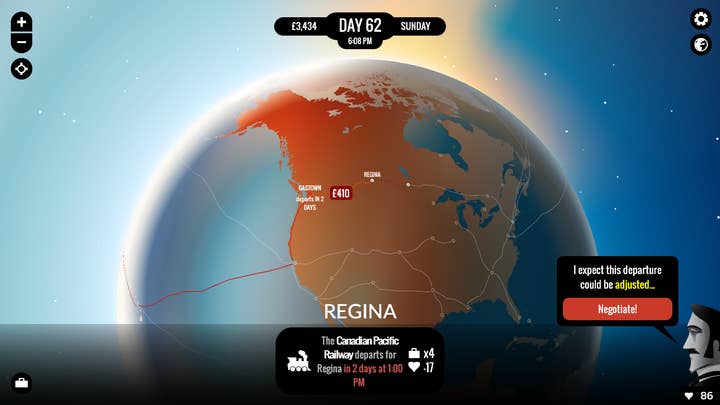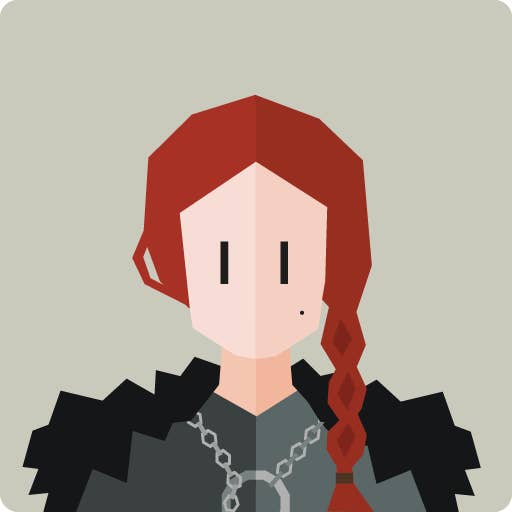Leigh Alexander: "Power fantasies are boring"
The award-winning narrative designer is tired of games giving players whatever they want -- it's time we explored "disempowerment fantasies" instead
The games industry is largely built on selling heroics. Defeat your enemies. Win the war. Save the universe. Rescue the princess.
But for Leigh Alexander, the award-winning narrative designer and writer of Reigns: Her Majesty, this is no longer compelling subject matter. Speaking at Reboot Develop in Croatia last month, she told attendees: "I generally find power fantasies boring."
The comment came during her reflections on Reigns: Her Majesty, and how she and developer Nerial were keen to do something different with the sequel. It would have been easy to make the player a queen, give them the same power as the original's kings, but then the difference between games would be negligible. It was far more interesting to build a game where the queen has direct influence over the king, but not his kingdom.
"I don't like games to do whatever I want," she tells GamesIndustry.biz after her talk. "I like games that enable me to have interesting experiences I can't have through any other medium, and I simply find it more interesting than when my desires are complicated, or where there's something to complicate the player's objective."
"I think we can have powerful experiences about learning to accept dissatisfaction"
Alexander wants stories to be less straightforward, too. Her favourite narrative game is Inkle's 80 Days, where the player is driven by the need to race around the world, but must balance that objective against their trading plans (items sell for more in certain markets, but is that where you were heading?) and their curiosity about the smaller stories that unfold.
"80 Days isn't only interesting because of the writing," Alexander explains. "It's interesting because when you're in a city and a stranger comes up to you, you have to balance, 'Do I need to leave, should I follow them, or should I sell this pearl?' Having the desire complicated immediately makes for a more interesting experience than if the game simply said, 'You can do whatever you want, you can have whatever you want.'"
She offers an example from the game's writer Meg Jayanth, with whom Alexander is launching "boutique narrative label" Red Queens later this year. Jayanth is often asked about a girl in 80 Days trying to get a letter about her tribe's suffering published in a newspaper. Players can offer to help, but she refuses -- and people are still asking how to convince her.
"They find it so hard to understand that you can't," says Alexander. "I think we can have powerful experiences about learning not to accept this, learning to accept dissatisfaction."

But that goes against everything players have been conditioned to do by decades of video games. The goal is to win; any puzzle presented has a solution, every lock a key. Developing games that defy this risks failure, surely?
"I don't think so," Alexander says. "We were having the same question in a different form five or ten years ago about difficulty. Should a game be easy or hard? Do we need the player to get to the end, or do we want them to have friction? If people say, 'Oh, hard games are fun,' then complicated decisions are also fun. This is the God Mode of narrative designs: hard decisions."
"I wouldn't play a game about just pushing buttons and getting whatever I want"
The secret to making player decisions harder, Alexander says, is conflicting objectives spread out over time, considering the short-, medium- and long-term of a player's experience.
"Think about what the player really wants to be doing in your game, and add a secondary or even tertiary objective that makes their desires more interesting and complicated. Mechanically, players are usually like, 'What do I want right now? To hit this thing. What do I want later? To get to the end of the level. What do I want? To finish the game.' That's your small, medium and long.
"We can think about narrative in that way, too. 'Right now I'm replenishing my inventory, but later I will go out to the woods because I want to meet the old man who is there.' All of that is in service to something larger mechanically. Having them work towards multiple things is a fun way of managing their emotions around their decisions."

Drawing on the source material of her most recent game, Reigns: Game of Thrones, Alexander offers Sansa Stark as a prime example of a disempowered character with complicated desires -- and desires that actually change over the course of the story.
"She wanted to be a lady, but she couldn't. Her expectations were thwarted and she had to make her own road. That's why I find her interesting. It's not, 'Oh she's such a strong woman', but she's an interesting character. She's become stronger.
"I want to be careful with stories that say we have to tenderise women with violence in order to make them admirable. I don't think Sansa's become so tough because of what she's been through; it's that her conventional wishes were thwarted and she had to look for other options. I would play a game about that, I wouldn't play a game about just pushing buttons and getting whatever I want."
It's a fascinating suggestion, particularly when the industry's answer to creating a strong female character is often giving a woman hefty weaponry and making her as physically capable as the men around her. The rebooted Lara Croft, Horizon: Zero Dawn's Aloy, the woman on the cover of Battlefield V -- it seems like the industry is trying to deliver more compelling female characters, but Alexander believes it's, "healthy to be suspicious of that."
"Just because we have more female characters doesn't mean we've raised the bar for women's stories in games"
"Just because we have more female characters doesn't mean we have raised the bar for women's stories in games," she adds.
Think again about those examples: Lara and Aloy are still power fantasies. Not that Alexander has any problem with this. She points to the ongoing superhero boom, with characters like Wonder Woman and Captain Marvel finally stepping into Hollywood's spotlight.
"It takes all kinds of entertainment to make the world. It's just for me personally, I am interested in women who are allowed to be gross and vulnerable because I am gross and vulnerable. I would like to see the industry shift towards more people telling more stories formed by their experiences."
Alexander hasn't always taken such a firm stance against power fantasies. She loved to play violent console games when she was younger, but her tastes have matured and her desire for something more nuanced has grown.
"I remember the first time I played God of War and ripped someone's head off, I was like, 'Yes, this is amazing.' But for me as a designer, I want to put players in complicated situations that challenge their values.

"Power is complicated. We're living in a time when it makes more sense than ever to question the role of power in society, how it's allocated, who does and doesn't have it. That thinking about the world is extending into my thinking about games. Disempowerment fantasies."
There are, of course, some disempowerment fantasies already on the market. Games like Bury Me, My Love or Change: A Homeless Survival Experience certainly don't make it easy for players to accomplish their goals, but these and other games like them hail from the indie space. Could we ever see EA or Activision investing in such unorthodox experiences?
"I am now free of any pretentions about elevating AAA in any way"
"No, because they can't," Alexander says. "The narrative games I think are good have small teams and quick prototyping. If you can very quickly test and throw things away, that improves your quality.
"Narrative design is really hard. You never know how it's going to work out until the end. Before Reigns launched, I felt really blue because I thought I'd done a terrible job. You just don't know. It's very stressful and it would be a nightmare trying to do it with hundreds of people in different offices."
When Alexander was a journalist, she often wrote articles about how she wanted more sophisticated and grown up games from the AAA publishers, but now she's not so sure.
"I feel like God of War should just be God of War," she says. "I don't think that certain traditional genres necessarily benefit from a lot of capital-S story. First-person shooters don't need more cutscenes -- people don't play those games for story, and we have to find other ways to deliver story besides making them watch movies... It's not that there's no story in God of War, it's more that players are more interested in the story of what they're doing moment to moment rather than the story of what's going on around them.
"I am now free of any pretensions about elevating AAA in any way, because the industry is so diverse there's something for everybody."
Instead, Alexander points to another market where you'll not only find Reigns and 80 Days, but other interesting narrative games like Florence and Another Lost Phone. Mobile has the broadest range of games on offer, although many struggle to sell particularly well despite any acclaim they receive. Nonetheless, she remains optimistic about the possibilities.
"There's no doubt we are in a challenging industry and challenging time in our industry," she said. "It's hard to tell what the future is. But mobile's as good a guess as any. Mobile is the place where everyone I know can play my game."





.jpg?width=291&height=164&fit=crop&quality=80&format=jpg&auto=webp)



